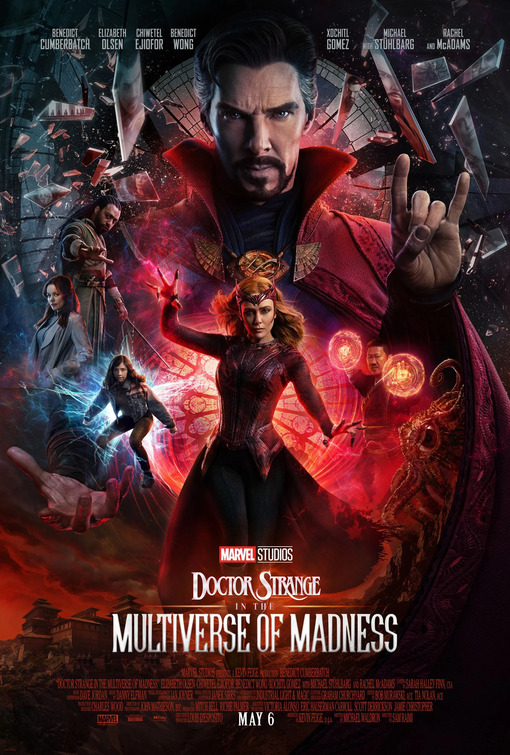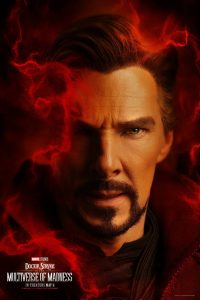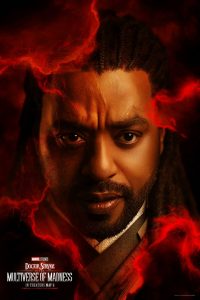Posts Tagged ‘John Krasinski’
Dream Walking and Witchcraft
Doctor Strange in the Multiverse of Madness

Director: Sam Raimi
Cast: Benedict Cumberbatch, Elizabeth Olsen, Rachel McAdams, Chiwetel Ejifor, Benedict Wong, Xochitel Gomez, Michael Stuhlbarg, John Krasinki, Patrick Stewart, Hayley Atwell, Lashana Lynch, Anson Mount
Running Time: 2 hours and 6 minutes
Film Rating: 6 out of 10
Six years after the first Doctor Strange film was made in 2016, Oscar nominee Benedict Cumberbatch (The Imitation Game, The Power of the Dog) reprises his role as the neurosurgeon turned warlock Doctor Steven Strange in director Sam Raimi’s utterly bizarre sequel Doctor Strange in the Multiverse of Madness starring a new batch of stars while only Rachel McAdams, Benedict Wong and Chiwetel Ejifor reprise their roles from the first film.

Director Sam Raimi best known for doing the original Spiderman trilogy with Tobey Maguire and Kirsten Dunst but the director is far better known for helming some classic horror flicks including Drag Me to Hell in 2009 and The Evil Dead in 1981, takes this Doctor Strange sequel and turns the superhero genre on its head and transforms it into a ghoulish mixture of the bizarre with an extremely heavy dash of CGI thrown in. The storyline is incoherent and utterly weird.

This time Doctor Strange has to save a multiverse superhero called America Chavez played by Xochitel Gomez from the clutches of the Scarlett Witch also known as Wanda Maximoff wonderfully played with a demonic edge by Elizabeth Olsen (Avengers: Infinity War, Wind River) as she seeks to use America’s superpowers to open the elusive book of Ashanti. Elizabeth Olsen is by far the best actress in this film as she gives the Scarlett Witch a degree of emotional depth and conflicting maternal instinct, making her character a far more unlikely villain.

Plenty of witchcraft and dream walking abound through a multitude of crazy universes including a particularly bizarre scene whereby Doctor Strange faces the Illuminati made up of Baron Mondo played by Chiwetel Ejifor (12 Years a Slave, Dirty Pretty Things, Kinky Boots), Captain Carter played by Hayley Atwell and wait for it…. an X-Men Professor and one of the characters of The Fantastic Four. Clearly this is not the multiverse of reality one expects.

Here the film completely loses the plot and director Sam Raimi goes for an utter freak show of scary scenes involving ghosts and demons instead of rounding off the narrative in a tightly controlled script.
After watching Benedict Cumberbatch deliver such a brilliant performance in The Power of the Dog, he looked continually anguished throughout this film at having to do a Doctor Strange sequel and not even a good one at that.
Essentially, my question is that if Marvel is so desperate to control the cinematic universe why did they get a horror director to take charge of what is meant to be a superhero film?
After watching the success of Spiderman: No Way Home and the excellent origin film The Batman, I was quite disappointed with the visual mess that is Doctor Strange in the Multiverse of Madness even despite some lavish special effects.
Doctor Strange in the Multiverse of Madness gets a film rating of 6 out of 10 and audiences should expect a superhero film which is way more scary than expected.
Terror at the Algiers
Detroit
Director: Kathryn Bigelow
Cast: John Boyega, Will Poulter, Algee Smith, Jacob Latimore, Jack Reynor, Hannah Murray, Kaitlyn Dever, John Krasinski, Anthony Mackie, Ben O’Toole, Jennifer Ehle
Oscar winning director of The Hurt Locker, Kathryn Bigelow comes with an impressive resume of films including Zero Dark Thirty. In her latest film with screenwriting partner Mark Boal Detroit, they viscerally tackle police brutality and racial tension in Motown, once the centre for the American automobile industry.
Detroit features a cleverly cast group of emerging young actors including British stars John Boyega (Star Wars: The Force Awakens) and Will Poulter (The Revenant), while director Bigelow dissects in vivid and intense detail a murderous incident at the Algiers Motel on the night of the 25th July 1967.
Bigelow goes beyond racial polarities and cinematically retells a terrible incident whereby a young group of African American men were terrorized by White police men at the Algiers Motel headed by the sadistic Krauss excellently played by Will Poulter in one of his most prolific onscreen roles.
The group of African American singers headed up by Larry played by Algee Smith are equally traumatized by the lengthy incident when all they wanted to do was establish their singing group The Dramatics hoping to raise a similar celebrity status to The Supremes as they attempt to perform in downtown Detroit when a riot causes the show to be cancelled.
This was the Midwest in 1967. The American civil rights movement was in full swing as was the deployment of troops in the infamous war in Vietnam. American society was transforming exponentially.
Detroit is an extremely important film about visual identification and racial representation made pertinent by the ongoing debate about whether director Kathryn Bigelow as a white female director is the right person to be retelling the horrific Algiers incident whereby white policemen play the death game on the group of young African American men and taunt them because they are courting two young white prostitutes Julie played by Hannah Murray and Karen played by Kaitlyn Dever.
The three policemen responsible for the incident are Demens played by Jack Reynor (Macbeth, Sing Street), Flynn played by Ben O Toole (Hacksaw Ridge) and the aforementioned Krauss. John Boyega plays Dismukes a young African American man working two jobs one in a an automobile factory and the other as a night security guard who stumbles on the events at the Algiers when Carl played by Jason Mitchell shoots a toy gun at the National guard in the midst of inner city race riots.
What stood out in Detroit was how all the characters both Black and White are affected by a heightened level of inherent violence and male aggression, something which Bigelow highlights and Detroit suggests that this aggression is endemic in American society regardless of skin colour.
Framed against the incident is also the emotional story of Larry’s refusal after the event and subsequent trial to continue performing in The Dramatics at downtown nightspots where mostly white policeman can enjoy Motown music.
The racial signifiers in Detroit are complex but the narrative tension is brilliantly executed with a resonance and skill rarely seen in contemporary cinema. Detroit is an important film for everyone to watch, contributing to a cinematic study of race relations internationally and raises pertinent questions of visual representation.
Detroit gets a film rating of 8 out of 10. Highly recommended viewing for those that enjoy intelligently told docudramas about the turbulent 1960’s in America.
Benghazi Backlash
13 Hours: Secret Soldiers of Benghazi
Director: Michael Bay
Cast: John Krasinski, Pablo Schreiber, James Badge Dale, Toby Stephens, David Denham, David Costabile, Matt Letscher, Alexia Barlier, Max Martini, Dominic Fumusa, Pablo Schreiber
Bad Boys and Transformers director Michael Bay turns to more recent geopolitical turmoil in the excellent and absorbing film 13 Hours: Secret Soldiers of Benghazi about the deadly attack on an American temporary diplomatic post in Benghazi in Libya on the night of 11th September 2012. This attack had such devastating consequences both diplomatically and politically that the Americans were forced to re-evaluate the postings of their diplomats abroad.
Comic actor John Krasinski beefs up in his first action role as Jack Silva a married man who does one last security mission abroad for a contract security company in Benghazi only to survive a horrendous night in which the worst possible attack occurred.
Other security personnel in 13 Hours include James Badge Dale as Tyrone Woods, Pablo Schreiber from Orange is the New Black as Kris Paronto along with David Denham as Dave Benton and David Costabile last seen in Showtime’s Billions as the commander of the security forces, Bob. Audiences should also look out for Toby Stephens (Die Another Day) as a Global Response Staff officer Glen Doherty.
What becomes apparent in 13 Hours, is that the Americans grossly underestimated the security situation in Libya post the fall of Gaddafi, who was toppled in a civil war in October 2011, the result of which was a sweeping tide of change across North Africa and the Middle East, now referred to as the Arab Spring. The American ambassador to Libya Chris Stevens, played by Matt Letscher in the film, was actually killed in the attack on the Benghazi compound by a group of heavily armed extremists.
Director Michael Bay sets the scene in Libya post Gaddafi as a powder keg, a dangerous power vacuum which occurred following the Libyan dictator’s death resulting in a stock pile of weapons being seized by warring militia groups who constantly battled each other on the streets of Benghazi and Tripoli.
13 Hours: The Secret Soldiers of Benghazi is based upon the book 13 Hours by Mitchell Zuckoff and is a riveting and controversial account of what actually took place in the chaotic events which lead to the vicious attack on the American Compound and the adjoining annex by a group of Islamic militants.
As a visual documentary of recent history, 13 Hours naturally comes off as an American tale of bravado and patriotism against a foreign enemy which is far more complex, lethal and indistinguishable. What the film does point to especially concerning the current conflict in Syria and the collapse of an ordered government in Libya is the cause of the dramatic influx of migrants to Western Europe from war-torn countries in North Africa and the Middle East mainly due to their geographic proximity.
In the tradition of the excellent Lone Survivor, 13 Hours is a riveting action film retelling a very recent historical event whose geo-political ramifications go far beyond the borders of Libya.
As 13 Hours points out, the Benghazi attack was a tragic American diplomatic event questioning who was really responsible for the security of American citizens in such a dangerous city when the threat matrix had been severely under estimated. Recommended viewing and sure to provoke ample discussion.
Source: Libya



